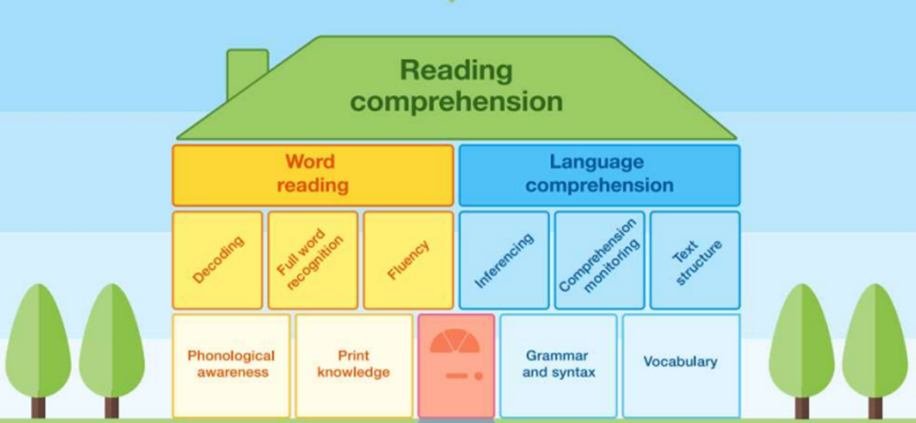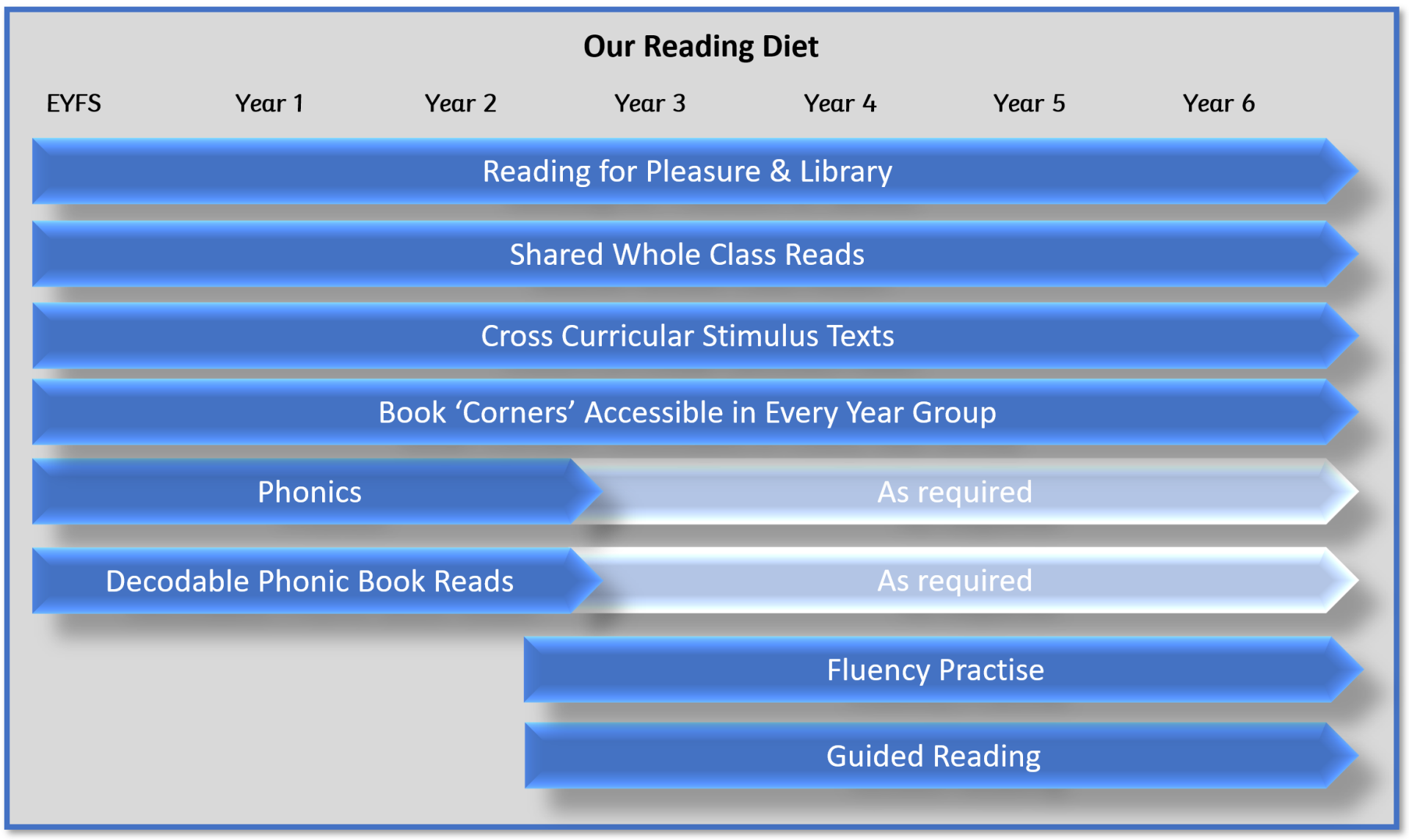Reading
“I want to hug every library, these miraculous institutions where new horizons line the shelves, where minds go to grow” Joseph Coelho, Children's Laureate 2022-24
The Reading House
Learning to read is a complex process as the diagram below demonstrates. A child must navigate and learn all these different elements to become a successful reader.

Research from National Literacy Trust
Key statistics in reading (2023)
- Just 2 in 5 (43.4%) children and young people aged 8 to 18 said they enjoyed reading in 2023. This is the lowest level since we first asked the question in 2005.
- Fewer than 3 in 10 (28.0%) children and young people aged 8 to 18 said that they read daily, matching levels seen in 2022.
- Half (52.9%) of 8 to 18-year-olds told us they had been encouraged to read by their parents/carers.
What else do we know about reading?
- Not reading at the expected level puts children at an increased risk of experiencing unemployment and poor health as adults. Find out more.
- Technology can provide a route into reading for traditionally reluctant less engaged readers. Find out more.
- Strong reading skills have been shown to improve children’s academic attainment across a range of subjects, including English, maths and science. Find out more.
 Nagy and Herman, 1987
Nagy and Herman, 1987
Our Reading Diet at Whitegrove

Reading for Pleasure (National Literacy Trust)
What is reading for pleasure?
Reading for pleasure can refer to any type of reading - fiction or non-fiction - that children engage with in their free time and of their own volition. When children read for enjoyment at school, it is untested and untethered from the demands of the curriculum. Our research suggests that reading for pleasure is something that has satisfaction simply "from the act of reading" but can also be something that "begun at someone else's request [but] we continue because we are interested in it." (Clark and Rumbold, 2006).
Benefits of reading for pleasure
There are many benefits to reading for pleasure. Our ongoing research into this area demonstrates a consistent link between reading for enjoyment and reading frequency. Reading for enjoyment therefore helps a child create a habit of reading which in turns supports the development of children’s language and learning. Reading for pleasure can also help to enrich a child's awareness of the world and develop empathy. There is also consistent evidence that reading for pleasure promotes positive mental wellbeing.
Why is reading for pleasure important?
Reading for pleasure can impact attainment and social mobility. PISA data consistently shows that engagement in reading is strongly correlated with reading performance and is a mediator of gender or socio-economic status. (The Reading Framework, 2023). Plus, reading for pleasure is linked to “higher test scores in vocabulary, spelling and mathematics [and] more strongly linked than parental education to cognitive progress in adolescence.” (Sullivan & Brown, 2015).
Reading for Pleasure at Whitegrove
At Whitegrove we promote “The Rights of the Reader” by Daniel Pennac. These rights include:
- The right not to read.
- The right to skip.
- The right not to finish a book.
- The right to read it again.
- The right to read anything.
- The right to mistake a book for real life.
- The right to read anywhere.
- The right to dip in.
- The right to read out loud.
- The right to be quiet.

Every year group has designated reading for pleasure slots in their timetable, where children are encouraged to choose and read books of their choice. They may choose to read alone or with some friends, on a chair, on the floor or even on top of the table!
We hold reading for pleasure events and workshops, where we invite parents in to share reading for pleasure with their children.
Library
"The only thing that you absolutely have to know is the location of the Library" Albert Einstein
Our School Library is in our Hub so prominently placed in the heart of our school, opposite the School Hall.
Libraries fuel curiosity, spark imaginations and foster a life-long love of reading and learning. With a wide selection of fiction and non-fiction books, our visits to our library are an opportunity for children to explore different genres and authors. We encourage children to take their time to browse our many books and to look at more than one before they choose one to take home.
Another benefit of borrowing a school library book is that it also encourages our children to develop one of our School Values - RESPONSIBILITY (to take a library book home, read it, look after it and return it on time - children can usually change books once a week with reminders about late books usually sent at the end of each half term).
In late 2022, we developed our library to create a dedicated and comfortable environment for teaching and learning. Children are able to use Chromebooks alongside non-fiction books to enhance their learning across the curriculum while developing digital and information literacy. Our aim is that every year group will be able to visit our library once a week.
Book ‘Corners’ accessible in every year group
Each class has access to quality texts to promote and support a love of reading. Books range from picture books, graphic novels, non-fiction, poems, newspapers, comic and much more.
Cross Curricular Stimulus Texts
We use a range of quality texts to support our work across all the subjects, not just English. Texts range from non-fiction books to inform about a science or history topic, to relatable stories to support our PHSE curriculum.
We also use stimulus texts to launch and engage children in whole school projects. For example, last year we used the book Leaf by Sandra Dieckmann to inspire a whole school art project. This year, we are using Quentin Blake’s Mrs Armitage on Wheels to launch a whole school Design and Technology project.
Shared Whole Class Reads / Storytime
Each year group has a timetabled slot for the children to sit back and enjoy being read to by an adult. Children are also invited to recommend a text that they think their peers would enjoy.
Phonics Decodable Books
Children in EYFS and KS1 receive three guided reading sessions within their phonics groups using the Monster Phonics decodable reading books which are closely linked to the sounds the children have been learning in their phonics lessons. The book is then sent home with the children at the end of the week to read at home with their parents
KS2 children receiving phonics instruction also receive three guided reading sessions a week using decodable reading books.
Fluency Practice
What is Fluency?
Reading fluency is a pre-requisite for the comprehension that is the purpose of reading. Reading fluency is the flow of words as we read. It can be productively analysed by looking at the components of oral reading fluency: accuracy, automaticity and prosody. (i.e. Are the words correct? Do they move at a rate that allows for unconscious decoding? Does the reading sound like a natural spoken voice?) (Such 2021)
Accuracy – ability to decode written words with little or no error.
Automaticity – ability to read quickly & with relative ease. McGuiness (2006) suggest that a reading rate below 90 words correct per minute (WCPM) make it close to impossible for meaning to be processed. Reading rates above 110 WCPM are likely to be required.
Prosody – ability to read in a way that sounds natural and comfortable, akin to spoken language - - tone, intonation, stress and rhythm of speech.
As the children become confident decoders, we move away from the phonics decodable books and move on to supporting and developing fluency.
Whole Class Guided Reading – Developing Comprehension
Comprehension skills are the strategies a reader uses to construct meaning and retrieve information from a text. Comprehension skills are very much like thinking skills. (Johnson, 1996; Perkins, 1986).
Whole class guided reading allows all pupils to read along with the teacher, enabling them to benefit from the teacher’s expert explanations, modelling, questioning and feedback.
We use a variety of different texts, from extracts, poems, adverts and songs to whole books. These sessions support the development of children's vocabulary, inference, prediction, explanation, retrieval and summarising / sequencing skills.
Parent Workshops
We hold parent workshops throughout the year to help parents in supporting their children through their reading journey.

